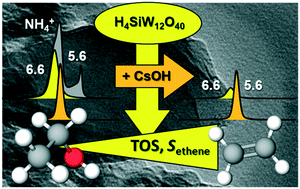Improved ethanol dehydration catalysis by the superior acid properties of Cs-impregnated silicotungstic acid supported on silica†
Abstract
We herein investigate the selective dehydration of ethanol at high conversions (>99.5%) and a moderate reaction temperature of 493 K over a silicotungstic acid (STA) catalyst supported on silica. The variation of STA loadings resulted in a linearly decreasing BET surface area with increasing STA content and the formation of negligible quantities of crystalline STA. In the 1H MAS NMR spectra, two distinct NH4+ species were identified after NH3 adsorption, i.e. Brønsted acid sites on the external surface of the STA nanoparticles corresponding to a chemical shift of δ1H = 6.6 ppm and Brønsted acid sites within the pseudo-liquid phase (PLP) corresponding to a chemical shift at δ1H = 5.6 ppm. At 36 wt% loading, all Brønsted acid sites were easily accessible, while at higher STA-loadings the intensity at 5.6 ppm increased slowly with exposure time to NH3 due to diffusion limitations. The lifetime of the STA catalyst has a maximum at a STA loading of 36 wt% exhibiting a TOS of 15.7 h. Impregnation with CsOH led to a slightly increased BET surface area. The preferred inhibition of external Brønsted acid sites is reflected by a decreasing intensity of the 6.6 ppm 1H MAS NMR peak of NH4+ ions. The inhibition increases the lifetime to up to 30 h at conversions above 99.5%, as a result of the suppressed formation of higher olefins as by-products. Thus, the impregnation with CsOH is an efficient way to reduce external Brønsted acid sites of supported STA catalysts and leads to a longer lifetime and selectivity in the ethanol dehydration process under industrially relevant conditions.



 Please wait while we load your content...
Please wait while we load your content...